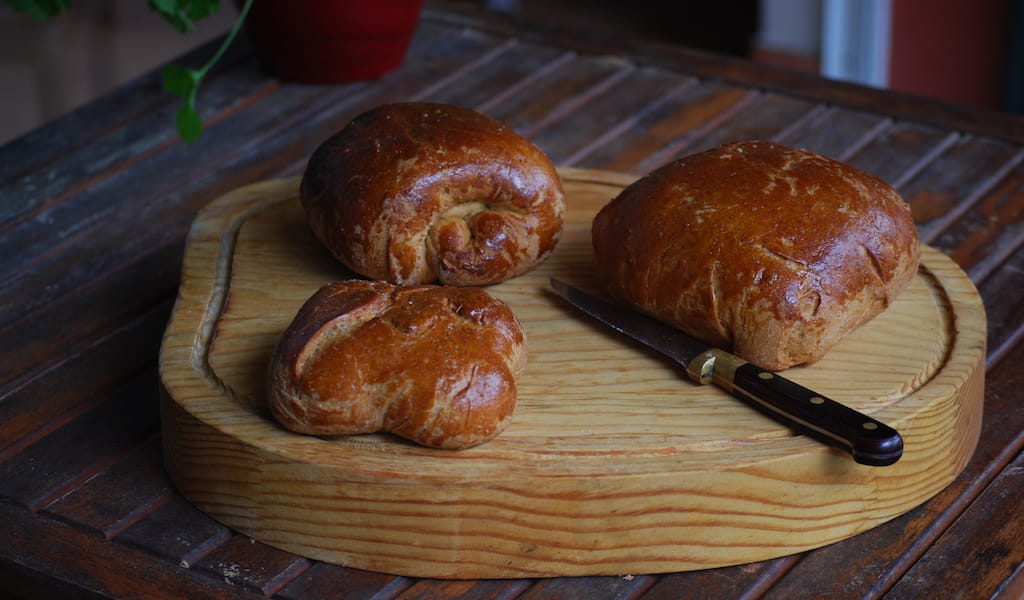It’s 6 a.m. Lately I’ve been waking up really early. I don’t expend enough energy I guess – not in the rhythms that I am used to anyway. Everything is suddenly so different, so eerie and lonely, and at the same time I feel like I’m being watched – as if I’m part of a movie or a weird version of Big Brother or Survivor, the kind of game show where everyone is on the same mission, but no one really trusts each other. Everyone’s scared of something invisible, and if you sneeze or cough, you get a strange look.
I was joking around with the few people who were worried about Covid-19 before it had even reached Europe. At the end of January, the coronavirus made it’s way to Italy – right next door. That’s when more people started worrying. I still had the attitude that “it’s just another flu,” which is probably what our Italian neighbors also thought, as they didn’t immediately take strict measures against the spreading of the virus.
The first reported case of coronavirus in Greece came on February 26. It was a woman who had just returned to the northern Greek city of Thessaloniki. A second case immediately followed – another woman, this time in Athens. Both had just come back from northern Italy. But I still didn’t think things would get so bad, even when the Carnival celebrations were all canceled.
On March 11, the Greek government decided to shut down all schools, cinemas and theaters, and canceled all scheduled events that involved large numbers of people. That was worrying and very inconvenient, I must admit. From then on, they gradually started shutting almost everything down. I’ve become obsessed with reading and watching the news. God bless the Internet.
Now there’s a lockdown, and you can only go out for a few specific reasons: to go to the supermarket, pharmacy, bank or work (if you must), to attend a ceremony (i.e. a funeral because weddings and christenings aren’t happening), to offer help to someone who needs it, to transport children between divorced parents, to exercise and to take out your pet. You need to declare why you’re going out, either by filling out a form, sending a text message or writing out the necessary info on a piece of paper.
I must say that, despite my initial skepticism about the severity of the virus, I have been impressed by the way the government has dealt with the situation so far. They were relatively speedy in their response to the crisis and tried to organize everything as best they could to avoid the spread of the virus. Although the number of reported cases is going up daily, they have managed to keep them relatively low (695 cases by this writing) – a huge help considering the bed, equipment and staff shortages at public hospitals in Greece.
The coronavirus is reportedly more dangerous to the elderly and people with prior health issues. Greece has one of the oldest populations in Europe, which is why the government needed to act fast in taking what some would consider draconian measures. The response is being led by Sotiris Tsiodras, an infectious disease professor and specialist who has won the hearts of Greeks. Every day around 6 p.m. the country tunes in to hear his daily report on the subject. Honest, calm and humble, he makes us feel like there’s no need to panic and that we’re all in this together. This sense of unification, of common purpose and compassion, even of a healthy national identity, were all facing extinction.
But keeping the elderly at home is no easy feat. On Friday, March 13, I went to a large supermarket near where I live. It was packed, and 80 percent of the customers in there looked to be over 70 years old. They were all on the hunt for hand sanitizer (out of stock almost everywhere), toilet paper and other “necessities.” Some looked like they were just hanging around, decked out in full coronavirus gear: masks and gloves. I went to the aisle with all the pasta and legumes, and the shelves were empty. People were frantic and gathered close together to chat about the empty selves – still not entirely aware of the dangers of being in such close proximity.
To prevent these supermarket gatherings and also to protect the heroes who work there, the government took new measures. Now we have to wait in line (keeping two meters distance from each other) outside the supermarkets until it’s our turn to enter. In addition, in order to control this shopping mania and make people feel safer, they now have extended the opening hours of all supermarkets.
Over the weekend that followed (when measures were still a bit looser), the weather was fantastic. The beaches were packed – everyone had the same idea, although others decided to go skiing at the nearby resorts. Others left to go to the islands, away from the “infected” city centers, without considering that if something happens to them on the islands they’ll spread the virus to non-affected areas that have very poor healthcare options.
But now the beaches and parks are closed, and the ferries are controlled, with non-permanent residents prevented from traveling to the islands. This past weekend, March 21-22, the Prime Minister announced a total lockdown as they are expecting a peak sometime in the next two weeks. A majority of the population is very understanding and following the government’s directives, but those few who don’t want to listen are a danger to the rest of us.
Perhaps the toughest thing for the elderly was giving up church, especially with Easter coming up. It was quite amusing for a while listening to priests and older people fighting for the church to stay open – a lot of good jokes circulated. But even the churches eventually closed their doors.
My daily routine is, well… have you seen the film Groundhog Day? That’s how I feel. I typically work long hours, but now I find myself in the awkward position of having too much free time – free time that must be spent inside the house. I live with Apollo, my seven-year-old son, in the center of Athens, and while he was initially ecstatic for his unexpected “holidays,” his enthusiasm has gradually faded away. I have explained everything to him – why we must stay home, why he can’t visit his grandma, why his birthday party needs to be canceled this year. He’s been very understanding and sensible. Still, how can you make a seven-year old stay calm in the house all day or remember to sanitize his hands if he touches something outside the house?
In the meantime, I play with Legos and build puzzles, I’ve read all about dinosaurs and space, built a volcano with lava, watched cartoons, played all the board games, made puppets out of old socks, sprouted lentils and beans… you name it, I’ve done it. It’s the one silver lining of the coronavirus – I’m spending lots of quality time with my son.
Of course, my favorite activity while being stranded in my apartment is cooking. I’ve been testing recipes and trying out new ideas, and consequently eating non-stop. (I have a feeling many people will come out of this with some extra kilos.) Still food (and wine, of course) is my main pleasure at the moment and I am not giving these up. Instead, I am going to share one of my favorite comforting Greek recipes that my son has been requesting for the last week: soutzoukakia. It’s basically meatballs spiced with garlic, cumin and wine, mixed in a tomato sauce. I like serving them with either rice or mashed potatoes. I promise you this dish is so comforting and tasty it will improve any day spent stuck inside.
Serves 4-6
For the meatballs:
600 gr ground beef
3 garlic cloves, minced
1 teaspoon ground cumin
1 cup red wine (I use mavrodaphne, a sweet red wine which can be substituted by port, or just use any other red wine you have)
1 egg
90 gr stale bread (no crust)
2 tablespoons olive oil
Sea salt
Freshly ground black pepper
Sunflower oil for frying
For the tomato sauce:
900 gr fresh, ripe tomatoes (can be replaced with canned chopped tomatoes)
1 garlic clove, chopped
1 full tablespoon tomato paste
1 tablespoon olive oil
1 teaspoon ground oregano
2 bay leaves
1 tablespoon grape molasses (can be replaced with a tsp of brown sugar)
Salt and freshly ground black pepper
1 tablespoon chopped parsley
Rice to serve
Put the bread in a bowl and soak in the wine for about 10-15 minutes. Strain the bread (but keep the wine that’s left) and shred it using your hands. In a big bowl add the ground beef, the egg, the bread, whatever wine is left, the olive oil, cumin, salt and pepper. Knead thoroughly, cover and refrigerate for about an hour. Shape them into small oblong meatballs and set aside.
In a frying pan, heat about ½ a cup of sunflower oil (this depends on the size of the pan, you basically shallow fry them so you don’t need too much oil). Shallow fry your meatballs until golden brown on all sides. Place them on kitchen paper to drain the excess oil.
In a large saucepan, heat a tablespoon of olive oil. Add the garlic and bay leaves and sauté for a minute. Add the grated tomatoes. [Note: In Greece, tomatoes are traditionally grated when used in rustic-style dishes. That means you wash the tomatoes and start grating them until only the skin is left on your hand. Alternatively, you can blanch them for a couple of minutes, at which point you can easily remove the skin, get rid of the seeds and then chop them. If you can’t get tasty fresh tomatoes, I recommend using canned ones instead. If you use canned tomatoes, you should add about ½ cup warm water to the sauce before it starts to simmer.] Add the oregano and tomato paste and stir. Simmer for about 15 minutes. Add the meatballs carefully and simmer for another 10-15 minutes. Chop the parsley and add it to the sauce. (Keep some to garnish on top.)
Serve rice and top it with soutzoukakia, pour extra sauce on top and sprinkle with chopped parsley.
To convert metric measurements to U.S. and British kitchen units, click here.
Editor’s note: With the coronavirus (Covid-19) crisis rapidly and profoundly impacting many of the cities we work in, we’ve asked some of our correspondents to file dispatches detailing how they and the places they live in are coping with this new reality. Our sixth report is from Athens, which recently announced a total lockdown.
Published on March 24, 2020

















































































